| |
 |
|
|
|
|
| I. Saying
"I'm not asking people to visit my garden, what I really want is people can plant more trees, love and protect them with suitable methods and practical actions."
Mr. Cheng Wu mentioned in the interview, "Back when National Government came to Taiwan, they failed to do a good job in solid and water conservation, instead they cut down trees indiscriminately, which led to the decrease of forests, the rise of temperature and huge damage to the ecological environment in Taiwan." Therefore, Mr. Wu decided to show us how important trees are to people in the way of planting trees. Recently, Mr. Wu's promotional activities have become increasingly successful, and those events gradually make people's sense of environmental protection much stronger each day. However, no pain, no gain. Mr. Wu has been through many hardships we don't know behind the curtain of success. Here we analyze and summarize the problems that Mr. Wu encountered and provide possible solutions.
- Growth of age: need family support and promotion inheritance
- Hazards of exotic tree species: ecological hazards from exotic tree species (cinnamomum burmanni, alstonia scholaris and taxodium distichum).
- Difficulties in tree planting: select tree seeds carefully and take care of them attentively.
- Protected method: more trees, less cement
|
| TOP |
II. Ageing
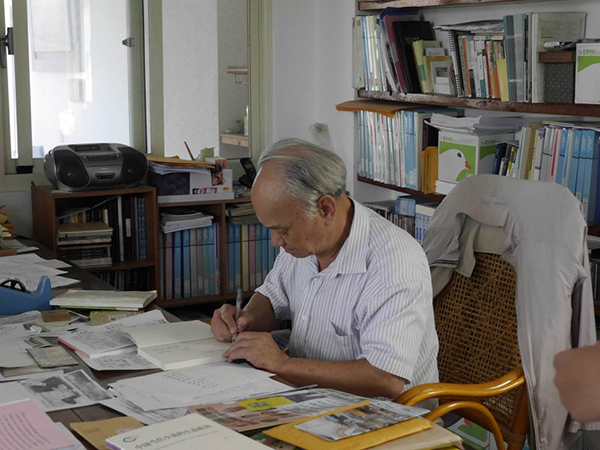 |
Photo of Mr. Cheng Wu |
Mr. Cheng Wu now is over 70 years old, as time passes by, his families are disagree that he continues promoting education and planting trees, but he has faith in himself to keep going. His family said they do not approve his behavior, yet still be there for him and support him forever no matter what happened. He promotes local culture actively, as long as there's an invitation he always spares no effort to deliver speeches wherever he can. However, as he grows older, his family gets to worry about his health condition. He went to the National Taiwan Normal University to give a speech themed "Wounded Language and Her Contusion" and discuss the loss of Taiwanese with other writers. Mr. Wu said: "One thing I regret most is that I didn't write in native language."
Wu hold the view that "mother language" is like "native species", living and growing in the suitable land, like michelia compressa, a typical native in Taiwan. Although over ten years' development, it is such a waste that people would take the risk to destroy the environment, the nature, ruin the existing perfect objects with huge value, such as languages and ecology. The disappearance of language is like the extinction of species, so if we can reserve the special Taiwanese language, the mother language of Taiwan, we reserve a very own special specie in Taiwan.
Source: http://pr.ntnu.edu.tw/news/index.php?mode=data&id=12237 |
| TOP |
III.Hazards of exotic tree species
Mr. Cheng Wu pointed out that native seedlings are very common, in order to pursue amply profit, the tree merchants will choose to sell high-priced exotic trees instead of low-cost native trees, such as alstonia scholaris, madagascar almond, cherry trees and the latest taxodium distichum. All of these species will cause serious damage when typhoons hits, meanwhile cause loosening of soil and rocks, resulting in landslides. Thus trees species should be selected carefully. But sometimes exotic species might be planted by mistake, such as when he went to Forestry Bureau to pick up plants, without careful observation, he got a knock-off version of the native cinnamon and cinnamomum burmanni.
Alstonia scholaris
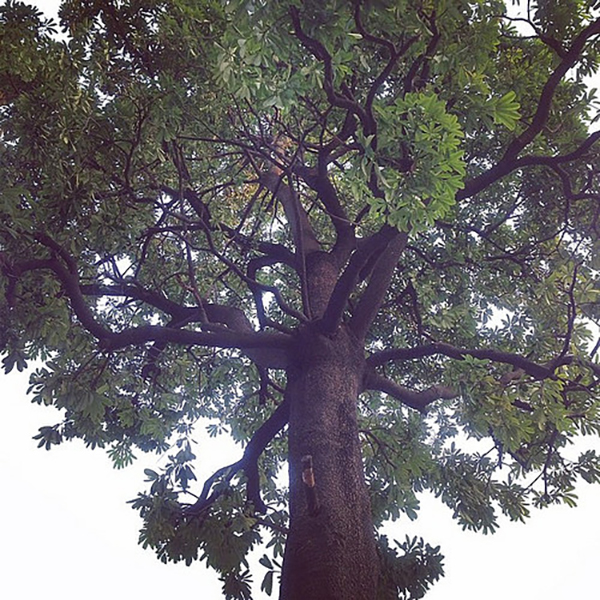 |
| Alstonia scholaris |
Alstonia scholaris, also known as ficus elastica, it grows fast and can reach 9 meters in 3 years, 25-30 meters in 10 years. Besides, November to December is its flowering time, after which a long fruit will be born. They will be spread by the force of wind, and also because this kind of tree can easily stay alive without daily care. The disadvantage is that it is not a native tree specie in Taiwan. It originates from India to Indonesia, Vietnam, Malaysia and so on. With its short roots, it will be used as street trees. However once a typhoon arrives, it will be collapsed then cause many disasters. Furthermore, alstonia scholaris trees are toxic, and the damaged parts of its branches and leaves produce a kind of poisonous white milk. When someone is poisoned, he or she will have symptoms like vomiting, diarrhea and some other disturbing reactions. The flower of this kind of tree is not very delicious, plus its roots can easily break the dike, and it is not flammable.
Source: https://zh.wikipedia.org/wiki/alstonia scholaris
Source of photo: https://www.flickr.com/photos/pbear6150/16577561752
Cinnamomum burmanni (Indonesian cinnamon)
Indonesian cinnamon has strong adaptability and can grow rapidly in Taiwan, with its lush green branches and leaves, and abundant seed production. It has strong natural seeding ability, and the average germination rate of its seed is high. It has the potential to change Taiwan's ecosystem. After birds feeding on those seeds, the seeds they discharged germinate quickly and can be spread widely and fast, which will transform into strong species, occupying the growth space of primary trees, having the ability to invade the originally secondary forests and primeval forests in Taiwan. In addition, Indonesian cinnamon has a long flowering period and may naturally hybridize with native cinnamon or other native camphor trees.
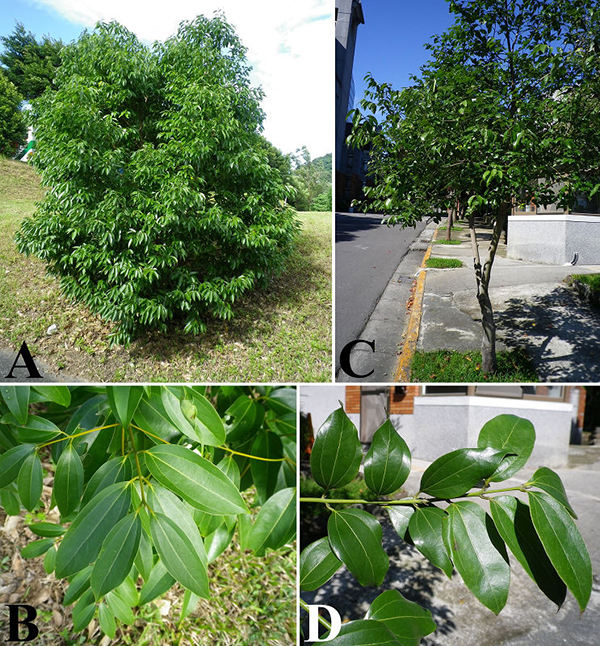 |
| A, B tree shape and leaf shapes of Indonesian cinnamon; C, D, tree shape and leaf shapes of native cinnamon. |
* Introduction and differentiation of native cinnamon and Indonesian cinnamon
| Projects compared |
Native cinnamon |
Indonesian cinnamon |
Features |
The trunk bark is smooth, sticky and has strong cinnamon fragrance. It tastes spicy and smells fragrance of cinnamon. |
Its adaptability in Taiwan is extremely strong with speeding growth, flourishing branches and amply leaves with abundant seed production. |
| Odor |
Rubbing will give off distinct cinnamon fragrance. |
Rubbing will produce the pungent smell of camphor tree plants. |
| Leaves |
Leaves on branchlets are light green, leathery with grey-green back. |
Leaves on branchlets are red, papery with light green back. |
Taxodium distichum
Taxodium distichum is originated from the United States, it is not sensitive to wind, wet, almost free from any pests and diseases. Taxodium distichum prefers humidity, those who grow in marshes have strong wooden cylindrical knee roots, reaching out of the ground, grow quite well in the wet swamp environment where drainage is unblocked; its seeds generally germinate in wet soil and can't germinate underwater, however, can be kept underwater for 30 months; this kind of trees usually are planted in plains and lakes, riverbanks and water network areas. Its impact on Taiwan's ecology is that its sharp roots may emerge above the water. So if visitors fall carelessly, this may cause danger.
Source: https://zh.wikipedia.org/wiki/%E8%90%BD%E7%BE%BD%E6%9D%89
Source of photo: https://travel.yam.com/Article.aspx?sn=99513
Source of photo: https://www.parenting.com.tw/article/5073138-/
|
| TOP |
IV. Difficulties in tree planting
Selecting seedlings carefully
From the very beginning when Pure Garden changed from farmland to woodland, from soil preparation, planting saplings and using small tree scaffolds, Cheng Wu had an insistence on the planting only Taiwan's first-class protogenous species, which means michelia compressa, diospyros strigosa hemsl, pistacia chinensis bunge and cinnamomum kanehirae. Mr. Cheng Wu said, "Because Taiwanese doesn't know how to cherish good things!" From the alstonia scholaris, canarium parvum leenh, to the cherry trees, all those trees planting in Taiwan is not suitable to the local environment at all. In order to provide more places for the trees to spread seeds, the garden now has sent about 1,000 trees, including 500 trees for the third cemetery in Xizhou to build a forest cemetery, and the rest for schools and other social groups.
Source: http://www.managertoday.com.tw/articles/view/42752
Only plant the native tree species
"Pure Garden" also experienced the sweep of Typhoon Soudelor, although branches and leaves were swept away, but not a single tree fell. Because almost all the trees in Pure Garden are native species in Taiwan, including camphor tree, michelia compressa, diospyros strigosa hemsl, native cinnamon, Taiwan phoebe zhennan, etc. Most of these trees were planted as seedlings, and the soil is rich and thick, which makes the roots connection with each other underground naturally strong. The imported trees, such as alstonia scholaris, it grows very fast, but its roots can be destructive to the road. Plus its flower may be allergic to people. Despite of this, because of commercial hype, every now and then there will be a trend in Taiwan planting trees that will bloom, such as kapok, tabebuia chrysantha, cassia fistula, jacaranda, cherry blossom, etc. These kinds of trees can only be planted a few as embellishment because they can't survive long enough and their roots are short, cannot deeply stick into the ground and falls down easily. Same situation with areca catechu, which often are planted on the hillside fields in Taiwan, while areca catechu has short roots and is difficult to grasp the soil.
Source: http://buzzorange.com/2015/09/18/tree/
Careful maintenance
The seedlings can easily be blown down by the wind, so special care should be taken at the beginning of planting. Especially during typhoon period, special attention should be paid to the seedlings, in case they were destroyed by strong wind and heavy rain.
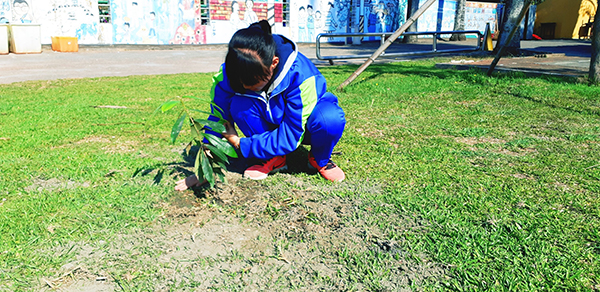 |
| Newly planted seedlings |
Know how to love trees and how to plant them.
Pure Garden serves as a textbook to promote environmental protection and hope that these trees can be used as textbooks to educate the next generation in the future. Welcome the public, the school applied for a visit to the garden. The promotion activities of Pure Garden shall be continued from generations to generations! so that we can create a better environment in Taiwan. It is also an expectation we want to live up that our ecology condition will recover soon, back to the early days, when insects and birds are singing, the water is clean and clear, and there is no air pollution in the sky.
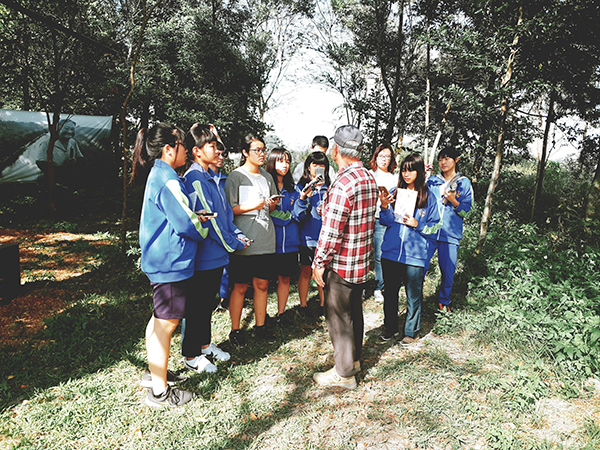 |
| We visited the garden together, and the teacher explained the concept of ecology and environmental protection to us |
|
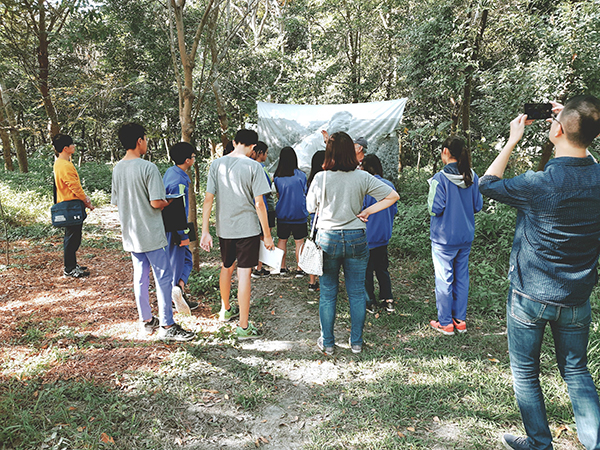 |
| Everyone listens attentively |
|
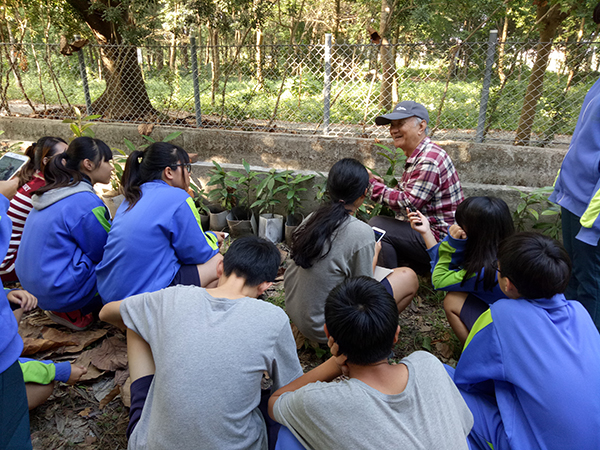 |
| Listen carefully to the planting way of diospyros strigosa hemsl |
|
|
| TOP |
V. Protected method
More trees, less cement
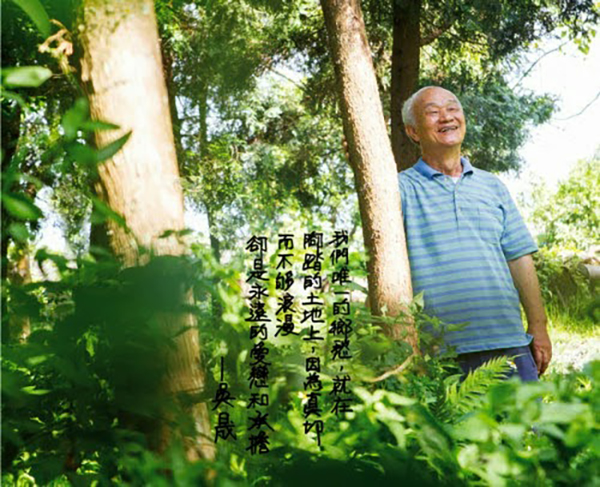 |
| Idea of Mr. Cheng Wu |
Cement not only absorbs heat, but also is isolated from water. Don't put cement around trees, so that the roots of trees can breathe freely and grow healthily! I hope people would pay special attention to this point when planting trees in the future: "more trees, less cement!" Every piece of land that gets donated trees, I sincerely hope they are treated kindly. |
| TOP |
VI. Conclusion
Although Mr. Cheng Wu is getting older, in order to make people getting to know the importance of trees, efforts have been made to promote native species. Planting trees is good for the environment, but we still hope that we can plant more of native trees and import less of exotic trees. We should not follow the trend of planting exotic trees because of the popularity, ignoring the damage it may cause. He once said: "ten years make trees, one hundred years make humans." We should be more patient with trees and not just give up halfway. It is everyone's duty to protect tree and in order to make the roots of trees grasp the soil tightly, we should do a good job in soil and water conservation and reinforce the implementation of the concept of protecting this land. |
| TOP |
|
Copyright © 2019 Si-Yang Junior High School
No.1, Xiagan Rd., Xizhou Township, Changhua County 524, Taiwan (R.O.C.)
TEL:04-8802151 FAX:04-8803142 |
|
|
|
